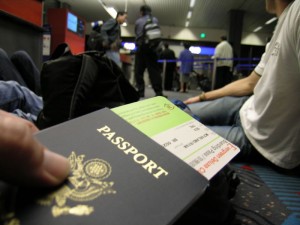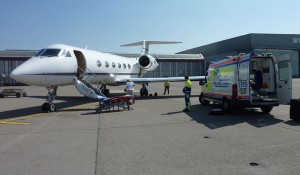
Traveling internationally requires more preparation than just grabbing your passport and packing your bags. Use our checklist below to prepare for a safe, healthy and successful business trip abroad:
√ Contact your bank and credit card companies to advise them of your travel dates and destinations.
This will help you ensure your credit card won’t be denied for suspected fraud when you pay for something after arrival. Ask your bank about the daily cash limit for ATM withdrawals to make sure you’ll have enough access to cash during your trip – and make sure you know their foreign transaction fees so you’re not hit with a nasty surprise when you get home. Be sure to ask if your bank has any overseas partners – using a partner bank may eliminate or reduce some of your ATM transaction costs.
√ Enable international calling on your cell phone.
We suggest asking your carrier about international data plans even if you plan on traveling for just a few days (you never know what can delay your return home!). Don’t just go with the  cheapest option, either. Be realistic about your usage. You’re better off getting a larger data package and not using all of it, rather than being charged through the roof for overages. Of course, there are other ways to go about making phone calls without paying costly roaming charges or expensive hotel room phone fees. We recommend purchasing a calling card before you leave for your trip. Callingcards.com is among the many websites that sell them and even offers international usage and rate charts for side-by-side comparisons. Be sure to learn how to actually make a call, too — use this simple rule of thumb for country-to-country calling: Country exit code + destination country code + phone number. Review this handy list of destination country codes and exit codes, as well as our full post on how to make an international phone call. And don’t forget: On Call members can call us collect from anywhere in the world!
cheapest option, either. Be realistic about your usage. You’re better off getting a larger data package and not using all of it, rather than being charged through the roof for overages. Of course, there are other ways to go about making phone calls without paying costly roaming charges or expensive hotel room phone fees. We recommend purchasing a calling card before you leave for your trip. Callingcards.com is among the many websites that sell them and even offers international usage and rate charts for side-by-side comparisons. Be sure to learn how to actually make a call, too — use this simple rule of thumb for country-to-country calling: Country exit code + destination country code + phone number. Review this handy list of destination country codes and exit codes, as well as our full post on how to make an international phone call. And don’t forget: On Call members can call us collect from anywhere in the world!
Pro travel tip: Speaking of smartphones, be sure to save the contact information for your hotel and airline to your phone prior to your trip. Most importantly, don’t forget to add emergency numbers for the nearest local U.S. Embassy (you can find this info via the State Department’s Country Specific Information pages) as well as your company’s appointed risk management personnel and travel risk management provider.
√ Research travel alerts and warnings for your destination.
The State Department issues Travel Warnings to recommend postponing travel to a country because of civil unrest, dangerous conditions, terrorist activity or, in some cases, because the U.S. has no diplomatic relations with the country and may have great difficulty assisting U.S. citizens in distress. Travel alerts are issued to distribute information about short-term conditions, either trans-national or within a particular country that pose significant risks to the security of U.S. citizens. It’s also a good idea to register your travel plans with the Consular Section of the U.S. Embassy by enrolling in the State Department’s Smart Traveler Enrollment Program (STEP). STEP enrollment provides you with the latest security updates for your destination, information about the nearest U.S. Embassy and also makes it easier for the U.S. Embassy or nearest U.S. Consulate to contact you in an emergency via phone or email. In addition, you can specify the people who are allowed to know your whereabouts through contact with the Department of State.
√ Get your travel documents in order.
Make copies of your passport, foreign visa (if applicable), airline tickets, hotel confirmation  details, trip itineraries, and credit cards and keep them in your carry-on. Keep your valuables – including your passport and local currency – in the same bag or one you’ll have with you at all times or in your hotel room safe. In the event your passport is stolen, a consulate can issue a temporary new passport with this information (On Call members can rest assured that we can assist them through the process). You may also wish to leave the same information, including your passport number, with a friend or relative in case your documents are misplaced during your travels.
details, trip itineraries, and credit cards and keep them in your carry-on. Keep your valuables – including your passport and local currency – in the same bag or one you’ll have with you at all times or in your hotel room safe. In the event your passport is stolen, a consulate can issue a temporary new passport with this information (On Call members can rest assured that we can assist them through the process). You may also wish to leave the same information, including your passport number, with a friend or relative in case your documents are misplaced during your travels.
√ Make an appointment with your primary care physician or travel medicine specialist at least 4–6 weeks before you leave.
Your doctor should ensure you get the proper vaccinations and medicines in preparation for your trip. You want to be up-to-date on all routine vaccinations (such as influenza, measles and mumps) and you may need other travel-related vaccines depending on your destination. If you have any health conditions (e.g. food allergies, diabetes, asthma), discuss with your doctor how to manage them while you’re away and ensure you have more than enough of any necessary prescription medication for the duration of your stay.
√ Confirm whether or not your health insurance covers you outside of the U.S.
Unforeseen medical issues can happen at any time – unfortunately, even while you’re traveling. That is why it’s important to learn what medical services your health insurance will  cover overseas. Although some health insurance companies will pay “customary and reasonable” hospital costs abroad, very few will pay for a medical evacuation back to the U.S. If you experience a medical emergency, On Call can provide you with medical transportation, including medical evacuation, to the hospital of your choice. Additionally, we provide our members with worldwide medical, dental, and pharmacy referrals, prescription assistance, 24-hour nurse helpline as well as guarantees of payment and benefits coordination (useful in those instances when you have to show proof of payment to receive treatment).
cover overseas. Although some health insurance companies will pay “customary and reasonable” hospital costs abroad, very few will pay for a medical evacuation back to the U.S. If you experience a medical emergency, On Call can provide you with medical transportation, including medical evacuation, to the hospital of your choice. Additionally, we provide our members with worldwide medical, dental, and pharmacy referrals, prescription assistance, 24-hour nurse helpline as well as guarantees of payment and benefits coordination (useful in those instances when you have to show proof of payment to receive treatment).
√ Apply for an International Driving Permit (IDP) if you plan to drive in your host country.
Although many countries do not recognize US Driver’s Licenses, most countries accept an IDP. IDPs are valid in more than 150 countries and contain your name, photo and driver information translated into ten languages. Even if you’re not planning to drive, an IDP is still good to have. Why? In the event you need to communicate with foreign authorities, this recognizable form of identification can help get you on your way more quickly.
√ Pack smart!
Pack light so you can move more quickly and have a free hand when you need it. It’s a good idea to carry a minimum number of valuables and plan places to conceal them. And we can’t stress this enough—avoid packing your passport, prescriptions and other vital items in your checked luggage in the event it is lost or delayed. Check out our post on how to Pack Like a Pro on your Next Business Trip for more tips including a helpful how-to on rolling and folding your clothes.
What other ways do you prepare for an international business trip? We’d love to hear from you in comments below.
Safe Travels!
Photo credits:
Cell phone from kev-shine
Passport from zieak
Air transport from Jdflyer


